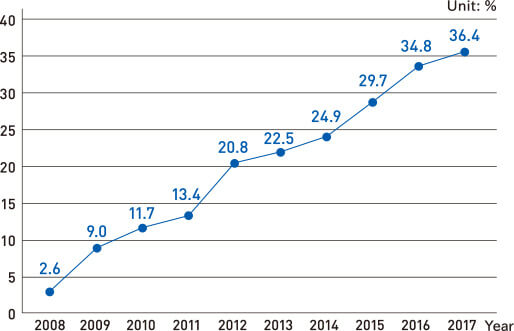Japan Promotes
Electrified Vehicle(xEV※) Strategy
ahead of 2050
PHEV(Plug-in Hybrid Electric Vehicle), FCEV(Fuel Cell Electric Vehicle)
Following the Paris Agreement signed at COP21 in 2015, countries and industries around the world began developing innovative solutions to tackle global climate change. Improving the environmental performance of automobiles, one of the largest global emitters, is a top priority. xEVs are one of the key technologies making fundamental changes to the automotive industry, in addition to innovations such as connected systems, autonomous driving, and car sharing services. By shifting production to focus exclusively on xEVs, the auto industry can drastically improve environmental performance and help cut global emissions.
In Japan, the market share for xEVs is approximately 30%. This strong presence demonstrates Japan’s high quality in the fields of technology, industry and human resources. Globally, the market share for Japanese xEVs is approximately 30%. Leveraging its strengths, Japan aims to further promote xEVs produced by Japanese automakers to tackle global climate change around the world.
Japan sets long-term goal by the end o f 2050, including: advance the shift of vehicles produced by Japanese automakers in global markets to xEVs; bring about environmental performance at the world’s highest level; and contribute to realizing a "Well-to-Wheel Zero Emission" policy (to reduce emissions to zero concerning a vehicle’s overall operation, from fuel and power producing process to running).
Long-Term Goal(by 2050)

- ※1: GHG: Greenhouse Gas
- ※2: MasS: Mobility as a Service
(mobility service that creates new value by connecting various transportation services)
‘Strategy Meeting for the New Era of Automobiles’
Adoption rate of next-generation vehicles in Japan

| Number of new vehicles sold in 2017(actual record) 4.386 million cars |
||
|---|---|---|
| Conventional vehicles | 63.6%(2.791 million cars) | |
| Next-generation vehicles | 36.4%(1.595 million vehicles) | |
| Hybrid electric vehicle | 31.6%(1.385 million vehicles) | |
| Battery electric vehicle Plug-in hybrid electric vehicle |
0.41%(18,000 vehicles) 0.82%(36,000 vehicles) |
|
| Fuel cell electric vehicle | 0.02%(849 vehicles) | |
| Clean diesel vehicles | 3.5%(155,000 vehicles) | |
‘The Motor Industry of Japan 2018’
METI ‘Strategy Meeting for the New Era of Automobiles’

